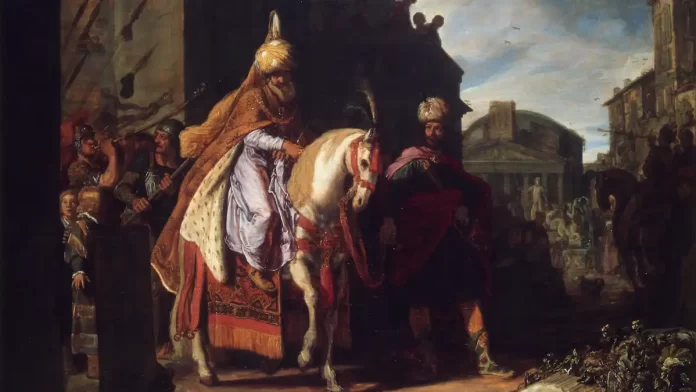In the annals of history, there are figures whose unwavering faith and refusal to compromise their beliefs stand as a testament to the power of conviction.
Among them is Mordecai, a figure revered in Jewish and Islamic traditions for his steadfastness in the face of adversity.
Mordecai’s story, steeped in courage and resilience, unfolds against the backdrop of ancient Persia, where his defiance against bowing to a high-born Persian noble Hanan and the king reverberates through the corridors of time.
Exploring his life and legacy through Jewish and Islamic lenses offers profound insights into the nature of faith and the pursuit of righteousness.
Mordecai: Family Background & Life
Mordecai, whose name means “warrior” or “servant of Marduk,” emerges as a central figure in the Book of Esther, a revered text in Jewish scripture. His lineage traces back to the tribe of Benjamin, one of the twelve tribes of Israel.
While not much is known about his early life, Mordecai reportedly resided in the city of Susa (Shushan or Shoushan), a metropolis of Persia (now Iran).
He adopted his orphaned cousin (Esther 2:7), Hadassah (Esther), whom he brought up as if she were his own daughter.
Though elite Persian kings did not marry outside of seven Persian noble families, they maintained large harems where “young virgins” were sought.
According to some Jewish narratives Esther was also presented to King Ahasuerus (Xerxes I) and was later made queen in the place of his exiled queen Vashti.
Subsequently, Mordecai who had accompanied Esther discovered a plot of the king’s chamberlains Bigthan and Teresh to assassinate the king. However, because of Mordecai’s vigilance, the plot was foiled and he was duly rewarded for his loyalty.
Persecution by Haman
Mordecai’s problem in Iranian court began with Haman, an Agagite who had been raised to the highest position at court. In spite of the king’s decree that all should prostrate themselves before Haman, Mordecai refused to do so.
Drawing from Jewish scripture, the Book of Esther recounts Mordecai’s defiance in the face of tyranny:
“All the king’s servants who were at the king’s gate bowed down and paid homage to Haman, for the king had so commanded concerning him. But Mordecai did not bow down or pay homage.” (Esther 3:2)
Haman, stung by Mordecai’s refusal, resolved to kill not only Mordecai but all Jewish exiles throughout the Persian empire, and won the king’s permission to carry out his plan.
Mordecai communicated Haman’s scheme to Queen Esther, who used her favor with the king to reverse the scheme, leading the king to authorize Jews to kill their enemies, which they did.
Haman also met his fate as he was hanged on the very gallows he had built for Mordecai (Esther 7:9-10).
Character and Beliefs
Mordecai’s character is defined by his unwavering faith in God and his refusal to compromise his principles.
In the Book of Esther, Mordecai’s steadfastness is demonstrated when he refuses to bow before Haman, a high-ranking official in the Persian court. Despite the pressure to conform, Mordecai remains resolute in his allegiance to God, setting a powerful example of moral courage.
Islamic tradition similarly portrays Mordecai as a paragon of faith and righteousness. His commitment to monotheism and refusal to prostrate before anyone but Allah exemplify the core tenets of Islamic belief. Mordecai’s actions reflect his unwavering conviction in the face of oppression, inspiring generations of believers to stand firm in their faith.
The Holy Quran briefly mentions the story of a righteous woman who saves her people (Surah An-Naml, 27:6-12), which some Islamic scholars interpret as an allusion to Esther. While Mordecai isn’t explicitly named, his role in the events leading to Jewish salvation is acknowledged.
Legacy and Influence
Mordecai’s legacy transcends the pages of scripture, resonating with believers across generations and cultures. In Jewish tradition, his story is commemorated annually during the festival of Purim, which celebrates the deliverance of the Jewish people from Haman’s plot.
Mordecai’s steadfastness serves as a reminder of the importance of remaining faithful to one’s beliefs, even in the darkest of times.
Similarly, in Islamic tradition, Mordecai’s example continues to inspire believers to uphold their faith in the face of persecution and oppression. His unwavering devotion to God serves as a beacon of hope for those who strive to live according to the principles of righteousness and justice.
There’s no mention of Mordecai’s death in the Book of Esther or the Quran. Rabbinic tradition suggests he lived a long life and is buried in Susa alongside Esther. Islamic narratives do not elaborate on his fate.
Therefore, the concept of martyrdom, implying a violent death for one’s faith, isn’t directly associated with Mordecai in either tradition.
However, Mordecai’s unwavering faith and courage in the face of adversity continue to inspire generations.
Islamic tradition echoes this sentiment, emphasizing Mordecai’s steadfastness in his faith:
“Indeed, Allah chose Adam and Nuh (Noah), the family of Ibrahim (Abraham), and the family of Imran above the worlds. They were descendants one of another. Allah is All-Hearing, All-Knowing.” (Quran 3:33-34)
Conclusion
Mordecai’s story stands as a timeless testament to the power of faith and conviction. From his refusal to bow before a king to his martyrdom in defense of his beliefs, Mordecai’s legacy continues to inspire believers across Jewish and Islamic traditions.
His unwavering commitment to righteousness serves as a guiding light for those who seek to live lives of faith and integrity in an often tumultuous world. As we reflect on Mordecai’s journey, may we draw strength from his example and strive to emulate his unwavering devotion to God and justice.
